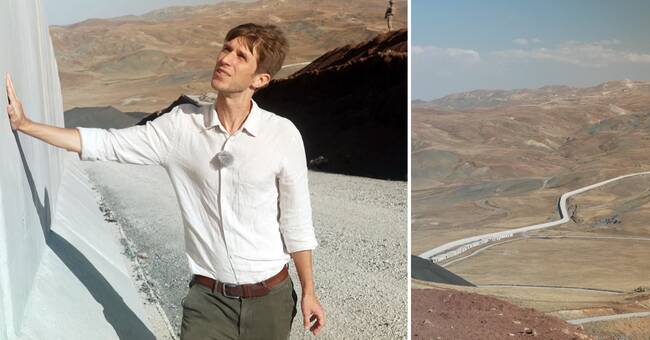On a windswept hill, three-meter-high concrete blocks meander along the horizon.
The idea is that the newly built wall will stop the refugee route from Iran, which is mainly used by Afghans who want to move on to Europe.
It is usually difficult to travel in the border area of eastern Turkey.
Police and military routinely pick up journalists for lengthy interrogations.
But this time we are invited by Turkish authorities who would like to show off the newly built wall.
Commanders line up in front of the cameras.
An image in line with President Erdogan's message to the outside world.
Do not want to be tempted
The wall is a political signal that Turkey wants to avoid becoming a refuge for Afghans fleeing the Taliban at all costs, in the way that Turkey has received almost four million Syrians.
When the war in Syria broke out ten years ago, Turkey took pride in opening the border to people on the run.
Turkey, like many other countries, is now being accused of denying refugees the right to seek asylum.
Several people we meet at the border testify that Turkish security forces are pushing refugees and migrants back to Iran, without being given the chance to have their protection needs legally tried.
Dissatisfaction with refugee policy
Since the refugee agreement with the EU from 2016, when Turkey agreed to host millions of Syrians for payment, dissatisfaction with the country's refugee policy has grown sharply at home.
The hostility is so strong that it often erupts.
Last summer, a lynching mob attacked Syrian businesses and homes in Ankara.
President Erdogan is under heavy pressure on the refugee issue.
Opposition leader Kemal Kilicdaroglu accuses the president of secretly negotiating with the EU to receive Afghan refugees in exchange for payment.
An accusation that Erdogan denies.
Should keep refugees away
Murbygget is a way of showing vigor to keep refugees away.
The Western world cannot overthrow the Afghans' opportunities to seek refuge in Turkey, President Erdogan and other government officials repeat in their speeches.
So far, no major wave of refugees has come from Afghanistan to Turkey.
The journey from Afghanistan to Turkey via Iran is expensive and dangerous.
There is also a delay from the people's decision to try this route out of Afghanistan, until they arrive in Turkey.
Assessors believe that the number may increase this autumn, despite the risks.
Anonymous cemeteries
All those who do not survive the trip to Turkey due to diseases, accidents and suspected murders of human traffickers were buried in an insignificant cemetery on the Turkish side of the border.
Baby it says on a tombstone.
Afghan it says on another.
But most tombstones only get one number.
While the outside world is restricting the opportunities for Afghans to seek asylum, the risk appetite is also growing, says a human rights lawyer Mahmut Kacan who assists asylum seekers in the border area.
He predicts that there will be even more anonymous tombstones this fall.

